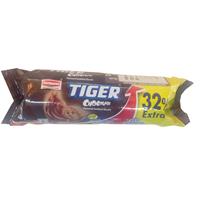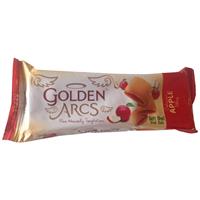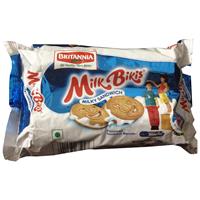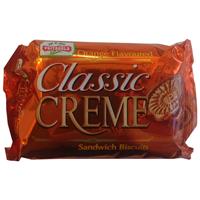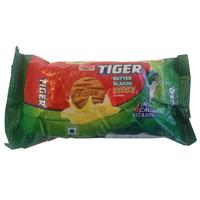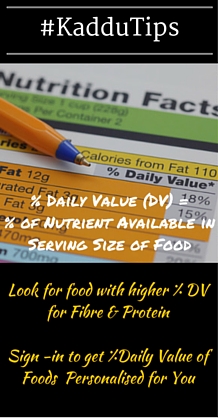
Britannia Tiger Chocolate Sandwich Biscuits
Products in ‘Cream Biscuits-Cookies’ category range from 0.5 - 1.5


- Compliments of Vitamins & MineralsThe micronutrients (Vitamins/Minerals) play an important role by ensuring proper functioning of cells and tissues.Each vitamin and trace mineral play a specific role in the body. For example, Vitamin C acts as antioxidant protecting cells from environmental damage, healing wounds and maintaining connective tissue whereas minerals like sodium, potassium and chloride function as electrolytes that assist in communication between cells necessary for nerve impulses and muscle contraction.Some products mimic the nature by adding artificial vitamins or minerals which have an identical form and function to those found in nature, but they are manufactured synthetically to meet extremely high standards of processed products.
- High in Fat
Calories in a food come from carbohydrates, protein and fat. The above product however has more calories from fat, which is not desirable and thus is considered “high in fat”.
So think again before you go binging on it, as every gram of fat matters!
- Know your Food- Sugar and its AliasesSome Food Products mask the amount of Added Sugar by using multiple forms of sugar and avoid displaying Sugar as one of the first ingredient. All Ingredient list are in descending order by their weight, so the position of sugar and its aliases can give an indication of the amount of 'Added Sugar'.Though the Nutrition Fact label on the food product gives you the Total Sugar, the regulation does not require the break up between natural and added sugar to be given. Thus, it is important to know the different sources of sugar that may be present in a food product to get an idea of added sugar.At the same time it is important to understand that the body does not distinguish between natural and added sugar, so take note of the Total Sugar in the Nutritional Fact label.Read more about the many different sources of sugar which includes Dextrose, Invert Syrup, Maltodextrin, Honey...
- Know your Ingredient - Edible Vegetable Fat“Edible Vegetable fats” in the ingredient list of a food product can be hydrogenated vegetable oil, bakery shortening, margarine, partially hydrogenated vegetable oils or Vanaspati (i.e. vegetable ghee). The keyword here is vegetable i.e. the fat is produced from a plant source not from animal source like milk.
Commonly, edible vegetable oil is converted from its liquid to solid or semi-solid form through the hydrogenation. The edible vegetable fat produced in this manner may also contain some amount of Trans Fat, whose consumption should be restricted.
However, some companies use edible vegetable fat produced from more advanced processing like fractionation thereby making it, trans fat free. - Highly Processed!Additives are added to the packaged foods for different reasons varying from increasing shelf life, to provide flavour and texture, increasing nutrition quality or required to manufacture some types of food.One of the ways to determine the degree of Processing is the number of additives you find in the ingredient list. The higher the number of additives greater is the degree of processing. Additives can be identified by looking for ingredients that begin with 'E' and have a number in them.It is generally recommended that food that is closer to nature is better hence it is better to choose food products with lesser number of additives.
- Loaded with Sugar
Each serving of the product has at least 1 teaspoon (5g) of sugar in it which makes it a sugar rich product.
One of the immediate side effects of high sugar intake is increase in fat deposits in the body which may increase your risk for obesity,diabetes and a host of other conditions.
Also, some studies suggest that its not FAT but sugar that is the cause for excess weight gain. Hence, best to avoid.
Disclaimer:Product Analysis is based on general practices in the field of Nutrition. Please check with or consult a qualified and licensed medical professional for its suitability to you.

